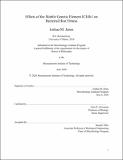| dc.contributor.advisor | Alan D. Grossman. | en_US |
| dc.contributor.author | Jones, Joshua M.(Joshua Mark) | en_US |
| dc.contributor.author | Grinberg, Ilana. | en_US |
| dc.contributor.author | Eldar, Avigdor. | en_US |
| dc.contributor.author | Grossman, Alan Davis. | en_US |
| dc.contributor.other | Massachusetts Institute of Technology. Department of Biology. | en_US |
| dc.date.accessioned | 2020-09-15T21:54:19Z | |
| dc.date.available | 2020-09-15T21:54:19Z | |
| dc.date.copyright | 2020 | en_US |
| dc.date.issued | 2020 | en_US |
| dc.identifier.uri | https://hdl.handle.net/1721.1/127369 | |
| dc.description | Thesis: Ph. D., Massachusetts Institute of Technology, Department of Biology, May, 2020 | en_US |
| dc.description | Cataloged from the official PDF of thesis. "Chapter 2. A mobile genetic element increases bacterial host fitness by manipulating development / Joshua M. Jones, Ilana Grinberg, Avigdor Eldar, and Alan D. Grossman"--Page 45. | en_US |
| dc.description | Includes bibliographical references. | en_US |
| dc.description.abstract | Mobile genetic elements drive bacterial evolution by mediating horizontal gene transfer and by carrying cargo genes that confer important traits to host cells. Traits provided by mobile genetic elements include antibiotic resistance, novel metabolic capabilities, virulence factors, and the ability to form symbioses. Mobile genetic elements, especially Integrative Conjugative Elements (ICEs), are abundant in bacteria. Many do not contain cargo genes with known functions, but some likely carry novel types of cargo genes that provide traits beyond the scope of those currently attributed to mobile elements. In this thesis I describe the characterization of a fitness benefit provided by the mobile genetic element ICEBs1 to its bacterial host, Bacillus subtilis. Activation of ICEBs1 conferred a frequency-dependent selective advantage to host cells during biofilm formation and sporulation. The advantage was due to inhibition of biofilm-associated gene expression and delayed sporulation, which enabled ICEBs1 host cells to exploit their neighbors and grow more prior to sporulation. I identified a single gene within ICEBs1, ydcO, as both necessary and sufficient for the repression of development. Manipulation of host development programs allows ICEBs1 to increase host fitness. These findings highlight that cargo genes can alter existing aspects of physiology rather than providing entirely new traits, broadening our understanding of how mobile genetic elements influence their hosts. | en_US |
| dc.description.statementofresponsibility | by Joshua M. Jones. | en_US |
| dc.format.extent | 111 pages | en_US |
| dc.language.iso | eng | en_US |
| dc.publisher | Massachusetts Institute of Technology | en_US |
| dc.rights | MIT theses may be protected by copyright. Please reuse MIT thesis content according to the MIT Libraries Permissions Policy, which is available through the URL provided. | en_US |
| dc.rights.uri | http://dspace.mit.edu/handle/1721.1/7582 | en_US |
| dc.subject | Biology. | en_US |
| dc.title | Effects of the mobile genetic element ICEBs1 on bacterial host fitness | en_US |
| dc.title.alternative | Mobile genetic element increases bacterial host fitness by manipulating development | en_US |
| dc.type | Thesis | en_US |
| dc.description.degree | Ph. D. | en_US |
| dc.contributor.department | Massachusetts Institute of Technology. Department of Biology | en_US |
| dc.identifier.oclc | 1192496443 | en_US |
| dc.description.collection | Ph.D. Massachusetts Institute of Technology, Department of Biology | en_US |
| dspace.imported | 2020-09-15T21:54:18Z | en_US |
| mit.thesis.degree | Doctoral | en_US |
| mit.thesis.department | Bio | en_US |
